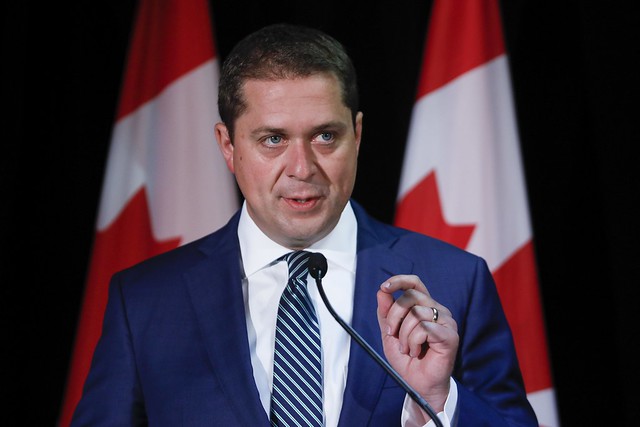
OTTAWA — Federal plans to speedily approve legislation freeing up billions in aid to help Canadians weather the COVID-19 pandemic have been held up over Opposition objections that the Trudeau government is attempting a power grab.
An emergency sitting Tuesday of the House of Commons was suspended moments after it began as Conservatives balked at provisions that would give the government sweeping powers to unilaterally spend, borrow and change taxation levels without Parliament’s approval for the next 21 months.
Conservative Leader Andrew Scheer said earlier that his party would support emergency efforts to get money to Canadians struggling with the COVID-19 crisis, but would oppose any “power grab” by the Liberal government.
His warning came a couple of hours before a small group of 32 MPs gathered in the Commons to debate and vote on legislation to deliver $82-billion in financial aid and tax deferrals to individuals and businesses, as proposed last week by the Liberal government to deal with COVID-19 and its ensuing economic havoc.
They convened as scheduled at noon Eastern time. However, the sitting no sooner began than government House leader Pablo Rodriguez asked that it be suspended so that the government could continue negotiating details of the legislation with opposition parties.
“Canadians need support to get through this. Fast,” Rodriguez tweeted shortly after the sitting was suspended.
“The negotiations with other parties are still ongoing and the House will resume later today. We all need to come together and get this done. Canadians are counting on us.”
The Liberals had said they would change the legislation before tabling it in the Commons but Scheer indicated during his morning news conference that the Conservatives had not seen a final draft.
“Today, Conservatives would like to focus on Canadians and passing the measures the prime minister announced last week,” he said. “Any conversation about new government powers should not get in the way of passing this much-needed assistance. Canadians are counting on us.”
Even as Scheer was speaking, Prime Minister Justin Trudeau tweeted that the legislation would be tabled “without clause 2,” suggesting the bill would not contain the offending elements.
But in a written statement, Scheer said “there are several aspects of the government’s legislation that are undemocratic.”
“Removing one does not solve the problem.”
At his own daily news conference outside his residence, where he remains in self-isolation after his wife contracted COVID-19, Trudeau said the government is trying to balance the need to act quickly to help Canadians with the need to remain accountable to Parliament.
“It is an exceptional situation that requires extreme flexibility and rapidity of response by governments to be able to help Canadians and react to a situation that we’ve seen is moving quickly every single day,” he said.
“So saying, we have a Parliament that works, we have an Opposition that is doing its job of making sure that we are taking the right steps the right way.”
Trudeau arrived late for his news conference because he was on the phone with opposition leaders. He said the government was negotiating “up until the last minute” to find a way to give it the flexibility it needs to get the money into Canadians’ hands quickly while maintaining “our democratic institutions and the values that are so important to us all.”
Scheer, meanwhile, sidestepped questions about whether the Tories are prepared to vote against the emergency-aid bill if it’s not changed to their satisfaction. Defeat of the bill would be a vote of no confidence for the minority Liberal government and possibly trigger an election.
The bill only needs one party’s support to pass the Commons eventually but it needs the support of every MP present to be put through on the one-day schedule the Liberals wanted.
“Justin Trudeau announced a number of measures last week and we’re here to support them,” Scheer said.
“Our hope is that (the government) will stay focused on providing to Canadians, not focused on a power grab. Not focused on giving themselves unprecedented new powers. We can be here on 48 hours’ notice to do exactly what we’re doing today: to pass measures to provide that assistance to Canadians.”
In an interview with The Canadian Press, Conservative finance critic Pierre Poilievre said the parliamentary budget officer has the bill and should be given the freedom by the government to immediately release an analysis, given the importance of the contents.
There may not be much time between the bill’s publication and the vote to pass it, he added.
“The public is not going to know who to believe so let’s free the parliamentary budget officer to tell everyone what’s inside it, publicly before it gets passed.”
In the few minutes the Commons did sit, deputy Speaker Bruce Stanton acknowledged that it was “a highly unusual sitting.”
Parliament adjourned on March 13 until April 20 as part of a nation-wide effort to curb the spread of the virus. It has been recalled to deal with the emergency aid package but with only about one in every 10 MPs present in the Commons, seated at least two metres apart.
The government had hoped the legislation would be approved by the Commons in a single day Tuesday, with the Senate signing off on it Wednesday, followed immediately by royal assent.
Meanwhile, the premiers of Ontario and Quebec are ordering non-essential businesses to close their workplaces by midnight tonight, provinces are contemplating closing their borders to each other, and Trudeau has hinted that harsh measures might be used to keep people from gathering in groups.
The death toll in Canada reached 24 yesterday as the number of confirmed cases of COVID-19 passed 2,000.